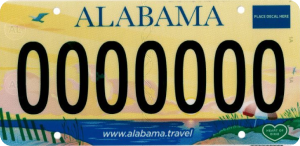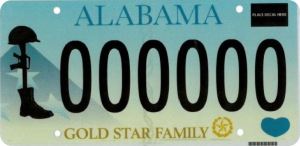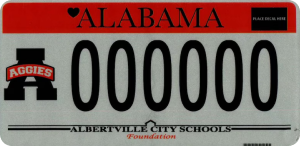In Alabama, where over 5.3 million vehicles are registered, a license plate lookup gives individuals access to information about a vehicle and its history. The right to this information is protected under state laws and federal regulations.
The lookup system helps promote vehicle safety and accountability across the state. Offering access to detailed information like title records, service history, and ownership details helps individuals make informed decisions, especially when buying a used car. It is also useful for checking accident history and reporting unsafe driving behavior.
Why Run a License Plate Search in Alabama?
Conducting a license plate search in Alabama can provide valuable information for various reasons. Here are some of the most common:
- Verifying the vehicle's history before purchasing a pre-owned car
- Reviewing records of previous accidents or damage
- Authenticating service history and mileage accuracy
- Confirming the vehicle is not listed as stolen
- Detecting outstanding liens or unpaid financial obligations associated with the vehicle
- Compiling relevant information for insurance claim processing
- Identifying any active safety recalls
- Ensuring adherence to regulatory requirements for commercial vehicles
Is it Legal to Perform a License Plate Lookup in Alabama?
Conducting a license plate lookup is permissible in the state of Alabama. Under the Alabama Open Records Law, the public can access certain vehicle information.
However, specific regulations protect personal data obtained from vehicle records. The most notable of which is the Driver's Privacy Protection Act (DPPA). This federal law prevents the misuse of such information for commercial purposes or in ways that infringe on an individual’s privacy rights.
Personal information can be used for the following legitimate purposes:
- Gathering essential details for filing insurance claims should individuals be involved in accidents
- Using information for law enforcement purposes such as official investigations and law compliance check
- Verifying if a vehicle has been reported stolen for fraud prevention
Individuals or organizations that improperly use this information may face substantial fines, the amount of which depends on the severity of the violation. In some instances, misuse can result in criminal charges, especially in cases like identity theft or harassment.
How Can You Conduct a Alabama License Plate Lookup?
The following are the most common services that can be used to conduct a license plate lookup in Alabama:

Alabama Motor Vehicle Division (MVD)
The MVD, which operates under the Alabama Department of Revenue (ALDOR), manages vehicle registrations, license plates, and driving records in Alabama. However, it does not offer an online system specifically designed to perform license plate lookups using plate numbers alone.
Those seeking vehicle information must explore other methods, such as calling the MVD directly at 334-242-9000 for guidance on license plate searches. Individuals can also visit their local county tax assessor's office to look up license plates. Each county maintains records specific to its area.
The availability of information depends on the requestor's authorization and the specific reason for the lookup.

Approved NMVTIS Data Providers
Many third-party websites offer license plate lookup services for a fee, but they are not all equal—some services are more reputable than others and comply better with privacy laws.
Several authorized providers of the National Motor Vehicle Title Information System (NMVTIS) offer vehicle history reports based on license plate numbers. The NMVTIS serves as a tool to protect consumers from fraud and unsafe vehicles by providing key vehicle history details. Some well-known services include:
- GoodCar.com
- InfoTracer.com
- Recordsfinder.com
- StateRecords.com
Typically, issued reports include information such as the vehicle’s ownership history, accident records, and other relevant details. However, the extent and accuracy of the information can vary depending on the service.
What Information Can You Obtain from a Alabama License Plate Lookup?
An Alabama license plate lookup can reveal various details depending on the type of search.
However, the accuracy of the information may vary depending on how quickly it was reported and updated in the system, with delays more likely in cases like private vehicle sales. Additionally, there are costs involved—basic lookups come with a standard fee, while detailed reports and special requests may incur higher charges.
A standard license plate lookup typically provides basic details about the vehicle, including:
- The vehicle’s manufacturer, model, and year of issue
- The drive type, whether it is front-wheel, rear-wheel, or all-wheel drive
- The type of transmission
- Information on the engine size
- The type of fuel and the vehicle’s fuel efficiency ratings
- Warranty information
- Manufacturer's Suggested Retail Price (MSRP)
A more detailed search can provide additional information, such as:
- Information on all past title transfers and ownership changes
- Issues like salvage, flood damage, or rebuilt status
- Any outstanding loans or liens on the vehicle
- A record of odometer readings
- Details of any manufacturer recalls and whether necessary repairs were made
In Alabama, individuals can also access state-specific data, such as:
- Current registration details and expiration dates
- The Alabama county where the vehicle is registered
- Taxes paid and tag details specific to Alabama’s registration system
- Verification that the vehicle meets Alabama’s insurance requirements
Due to privacy laws, personal data about the vehicle’s owner is not disclosed in a license plate lookup. This information includes the owner’s name, contact information, license number, and Social Security number (SSN).
What Does an Alabama License Plate Look Like?
Alabama rolled out its current standard-issue license plate design in 2022. The plate features a beach image, along with the web address "www.alabama.travel" at the bottom to promote tourism in the state. The iconic phrase "Heart of Dixie" remains a part of the design, displayed in a heart symbol in the lower right corner.

As per state law, Alabama updates its license plate designs that feature key elements reflecting the state's identity every five years. Personalized versions of the current license plate are also available for an additional fee of $50.
Alabama also introduced or redesigned several specialty plates, notably the Curing Childhood Cancer tag, which supports pediatric cancer research at the University of Alabama Birmingham Department of Pediatrics and Children’s of Alabama.
The redesign also featured the Alabama Gold Star Families tag for the families of military personnel who died in service and the Albertville City Schools Foundation tag, which raises funds for educational initiatives in the Albertville school district. Proceeds from the latter support training materials, computers, and various educational programs.



Alabama also adjusted its license plate expiration sticker policy in 2022. Previously, the state used a rotation of red, green, and yellow stickers to indicate expiration. Moving forward, only yellow stickers will be issued.

License Plate Types in Alabama
Below is an overview of the major license plate types in the state:
- Standard Plates: These are regular plates issued to most vehicles.
- Commercial Plates: These are specifically for vehicles used for business purposes and may have different fees and regulations.
- Temporary Plates: Issued for newly purchased vehicles, temporary plates are valid until permanent plates are received.
- Historical Plates: These are designed for vintage or classic vehicles that meet a specific age criterion.
The MVD has more detailed information regarding all license plates issued in the state.
Frequently Asked Questions (FAQs)
Refer to the following FAQs for additional information on Alabama license plate lookups:
Can I Look Up AL License Plates for Free?
Alabama license plate lookups can be done for free, but the available information is often limited. Free services typically offer basic details like the vehicle’s manufacturer, model, and year of issue. Paid comprehensive reports, often available through third-party services, offer a deeper dive into the vehicle's background.Do All Alabama License Plate Lookups Work for Custom or Personalized Plates?
Not all license plate lookups in Alabama guarantee success for custom or personalized plates. While standard vehicle information is generally accessible, unique identifiers associated with personalized plates may have specific restrictions. Users should verify whether the service they are using accommodates custom plate lookups.How Long Does a Typical Alabama License Plate Lookup Take?
When using online data providers, a standard Alabama license plate lookup is usually completed within a few minutes. However, the duration may vary depending on the service utilized and the complexity of the request, particularly if additional verification is required.Can I Perform Bulk License Plate Lookups in Alabama?
Bulk license plate lookups are permitted in Alabama, although they typically require special authorization or a commercial license. Businesses needing to conduct multiple lookups may have to use specific services designed for bulk requests, which generally come with additional fees.Are There Any Alternatives to a License Plate Lookup for Obtaining Vehicle Information in Alabama?
Individuals can file a request for vehicle information online through the MyDMV site, but records are only given to the registered person on file. For legal matters, individuals can contact the Alabama Department of Public Safety (DPS), which manages a statewide database. Accessing records requires submitting a Freedom of Information Act (FOIA) request.Another option is to do Vehicle Identification Number (VIN) checks through approved NMVTIS data providers. This method can provide detailed insights into a vehicle's history and ownership records.
